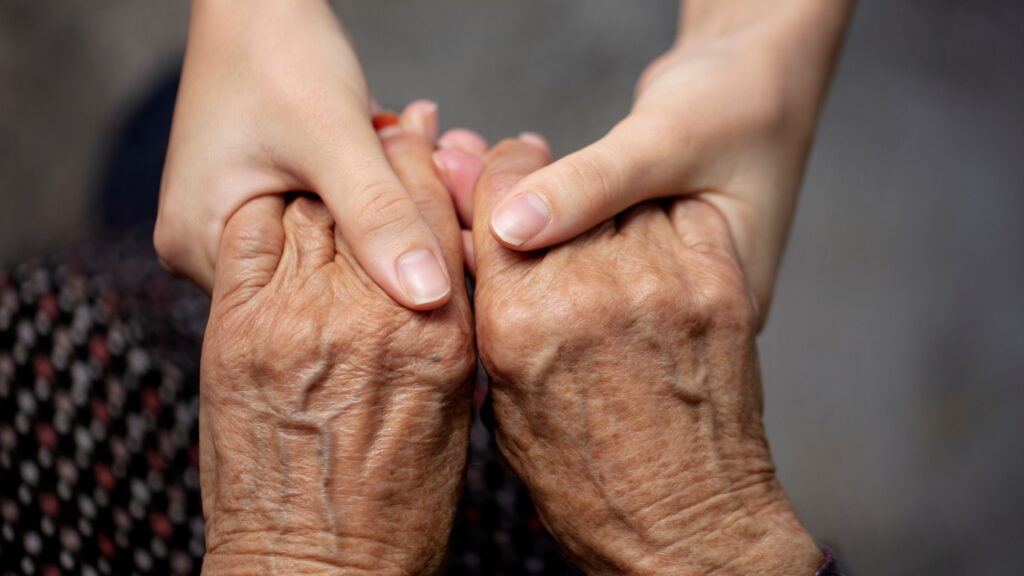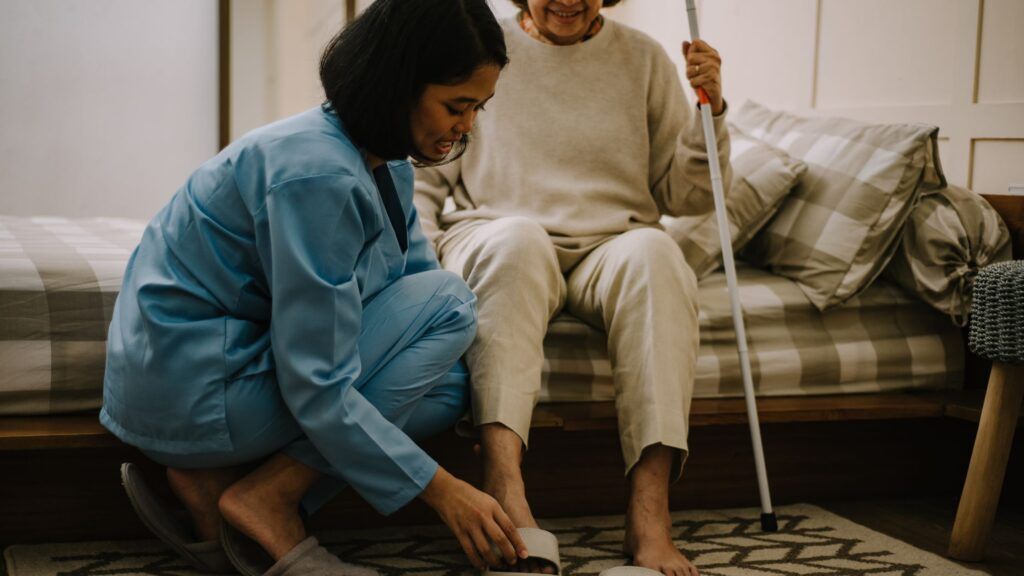As I walked into Grandma’s cozy Neenah, WI home, the familiar smell of her homemade apple pie filled the air. It was a comforting scent that always brought back cherished childhood memories.
But this time, something felt different…
The pie was still warm, yet Grandma couldn’t remember baking it. In fact, she didn’t even recognize me, her own granddaughter.
It was a heart-wrenching moment that marked the beginning of our family’s journey with dementia. Like so many others, we wished we had recognized the signs sooner. Early detection and understanding of dementia are crucial for providing the best care and support for our loved ones as they navigate this challenging journey.
That’s why we’ve created this useful guide to help you recognize the signs of dementia in your loved ones. Our goal is to empower you with knowledge, empathy, and the resources available in our Fox Valley community, including the exceptional care provided by American Grand.
Together, we can make a difference in the lives of those affected by dementia and their families.
Understanding Dementia
Dementia – it’s a word that can evoke a mix of fear, confusion, and uncertainty. But by understanding what it truly means, we can face it with confidence and compassion. So, let’s start by defining dementia and exploring its different types.
Dementia is an umbrella term for a group of symptoms affecting memory, thinking, and social abilities, severely enough to interfere with daily functioning. While Alzheimer’s disease is the most common form of dementia, accounting for 60-80% of cases, there are other types as well, such as vascular dementia, Lewy body dementia, and frontotemporal dementia.
Each type has its own unique set of symptoms and progression patterns, but all share the common thread of cognitive decline.
Now, you might be wondering, “Isn’t some memory loss just a normal part of aging?” It’s true that as we age, we may experience occasional forgetfulness or take longer to recall certain information.
However, dementia goes beyond these age-related changes. It involves significant memory loss, difficulty with problem-solving, and challenges in communication that disrupt everyday life.
The impact of dementia is far-reaching, affecting not only the individuals living with the condition but also their families and caregivers.
It can be emotionally, physically, and financially challenging for everyone involved. In our Neenah, WI community, we understand the importance of supporting each other during these trying times.
Places like American Grand Assisted Living Suites offer specialized care and resources to help ease the burden on families and ensure that their loved ones receive the best possible care.
By understanding dementia and its different forms, we can better recognize the signs, provide empathetic support, and connect with valuable resources within our community.
In the next section, we’ll delve deeper into the early warning signs of dementia, so you can feel confident in identifying and addressing any concerns that may arise.

Early Warning Signs of Dementia
As we venture into the realm of dementia, it’s essential to recognize the early warning signs. By doing so, we can provide timely support and care for our loved ones. Here are five key indicators that may signal the onset of dementia:
1. Memory Loss That Disrupts Daily Life
Forgetfulness is a part of life, but when memory loss starts interfering with daily activities, it’s worth paying attention. This could include frequently forgetting important dates, events, or recently learned information, and increasingly relying on memory aids or family members for things they used to handle on their own.
2. Difficulty Planning or Solving Problems
If your loved one is struggling with tasks that require planning, problem-solving, or critical thinking, it could be an early sign of dementia. For example, they may have trouble following a familiar recipe, managing their finances, or keeping track of monthly bills.
3. Trouble Completing Familiar Tasks
When daily tasks that were once second nature become challenging, it may indicate a cognitive decline. This could manifest as difficulty driving to a familiar location, managing a budget, or remembering the rules of a favorite game.
4. Confusion with Time or Place
Dementia can cause disorientation with time and place, leading to confusion about the current date, time, or even the season. Your loved one may also struggle with understanding visual images and spatial relationships.
5. Changes in Mood or Personality
Lastly, keep an eye out for shifts in mood or personality. Dementia can cause increased irritability, anxiety, or depression. You may notice your loved one becoming more easily upset or withdrawn from social activities they once enjoyed.
By staying vigilant for these early warning signs, we can better support our loved ones and connect them with the care they need. In the following section, we’ll discuss how to approach a loved one about your concerns while maintaining empathy and understanding.

How to Approach a Loved One About Your Concerns
Discussing concerns about dementia with a loved one can be a delicate and emotional experience. By approaching the conversation with empathy, patience, and understanding, we can create a supportive environment that fosters open and honest communication. Here are some tips to help guide the conversation:
Offer Reassurance and Empathy
Begin the conversation by expressing your love and concern for your loved one. Reassure them that you’re there to support them through this journey and that your primary goal is to help them maintain their well-being and quality of life.
Choose the Right Time and Place for the Conversation
Select a quiet, comfortable, and familiar setting for the discussion, free from distractions and interruptions. Make sure both you and your loved one are in a calm and relaxed state of mind, as this will facilitate a more open and productive conversation.
Use Open-Ended Questions and Active Listening
Encourage your loved one to share their thoughts and feelings by asking open-ended questions, such as “How have you been feeling lately?” or “Have you noticed any changes in your memory or thinking?”
Practice active listening by giving them your undivided attention, maintaining eye contact, and responding with empathy and understanding.
Share Your Own Observations and Feelings
Express your own observations and feelings in a non-confrontational manner. For example, you might say, “I’ve noticed that you’ve been having trouble remembering appointments lately, and it worries me.”
By sharing your perspective, you can help validate their experiences and create a foundation for further discussion.
Navigating the conversation about dementia can be challenging, but by approaching it with empathy, patience, and understanding, we can foster a supportive environment for our loved ones.
In the next section, we’ll explore the resources and care options available in our Neenah, WI community to help families and individuals affected by dementia.
Supporting a Loved One with Dementia
When a loved one is living with dementia, it’s essential to provide them with the support and care they need while also taking care of themselves. By adopting a compassionate and proactive approach, we can help improve their quality of life and ensure that they feel loved and understood.
Here are some tips for supporting a loved one with dementia:
Educate Yourself About Dementia and Available Resources
Knowledge is power, and by educating ourselves about dementia, we can better understand our loved one’s experiences and needs. Research the different types of dementia, their symptoms, and progression patterns.
Familiarize yourself with local resources, such as support groups, educational workshops, and memory care facilities within the Neenah, WI community.
Offer Practical Assistance with Daily Tasks and Decision-Making
As dementia progresses, daily tasks and decision-making can become increasingly challenging for your loved one. Offer practical assistance with tasks like meal preparation, medication management, and household chores.
Help them make informed decisions by discussing options and providing guidance when appropriate.
Encourage Social Engagement and Mental Stimulation
Social interaction and mental stimulation are crucial for maintaining cognitive health. Encourage your loved one to participate in activities they enjoy, such as hobbies, clubs, or social gatherings. Engage them in mentally stimulating activities like puzzles, word games, or reading to help keep their minds sharp.
Help Create a Safe and Comfortable Living Environment
A safe and comfortable living environment can significantly impact the well-being of someone with dementia. Make necessary modifications to their living space, such as removing tripping hazards, installing grab bars, and ensuring adequate lighting.
Create a calm and soothing atmosphere by incorporating familiar objects and comforting personal touches.
Practice Patience, Understanding, and Self-Care as a Caregiver
Caring for a loved one with dementia can be emotionally and physically demanding. It’s essential to practice patience, understanding, and self-compassion as a caregiver. Recognize your own needs and limitations, and don’t hesitate to seek help or support when needed.
Remember, taking care of yourself is a vital part of providing the best care for your loved one.
By following these tips, we can create a supportive and nurturing environment for our loved ones living with dementia. In doing so, we can help them maintain their dignity, independence, and quality of life throughout their journey.
Conclusion
In this blog post, we’ve explored the early warning signs of dementia, discussed how to approach a loved one about our concerns, and shared tips on providing support and care for those living with this condition.
By staying vigilant for the early signs of dementia and approaching the situation with empathy and understanding, we can better support our loved ones during this challenging journey.
Remember, it’s essential to educate ourselves about dementia, offer practical assistance, encourage social engagement and mental stimulation, create a safe and comfortable living environment, and practice self-care as a caregiver.
By doing so, we can help improve the quality of life for our loved ones and ensure they feel loved and understood.
We encourage you to be proactive in recognizing the signs of dementia and supporting your loved ones. If you have any experiences or questions you’d like to share, please feel free to leave a comment below.
For further information and resources, we invite you to connect with American Grand in Neenah, WI, where you’ll find a compassionate and knowledgeable team ready to assist you and your family on this journey.
Together, we can make a difference in the lives of those affected by dementia and create a supportive community for all.



